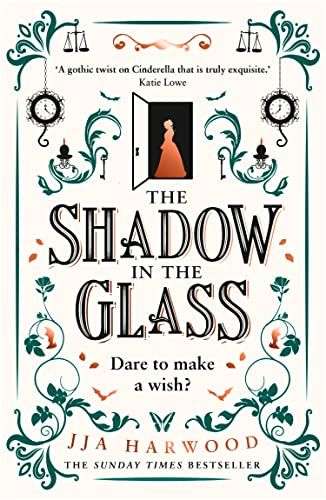THE SHADOW IN THE GLASS By JJA Harwood
Harper Voyager, h/b, £14.99
Reviewed by Matthew Johns

What if you took the classic tale Cinderella that we all know and love, a tale almost as old as time (well, dating back to ancient Greece, anyway) and gave it a darker twist? That’s been done before, right? But how about if you twisted it to combine it with Christopher Marlowe’s Doctor Faustus? That’s new, isn’t it?
Yes, in this version, young Ella, or Eleanor as her dear, departed mother named her, comes across a strange, new book within the library – her only place of shelter within the house she now serves in, where she tries to lose herself within a good book. Accidentally smearing blood on it from a paper cut on her finger, she drifts into a reverie about what she might wish for were she in place of Faustus. Waking with a start, she realises that a black-eyed woman sits opposite her. Not a woman with black eyes, but a woman whose entire eyes are black, like holes in her face. A woman who appeared despite the locked door. A woman who knows things about her, things that no one else does, that she has never spoken. A woman who has no shadow, then three, then two, then one tiny one. A woman who offers her a bargain – seven wishes in return for her soul. Not quite the fairy godmother you might have been expecting.
Ella’s mother had served the lady of the house, Mrs Pembroke, since they were teenagers. They’d been very close, and when Ella’s mother died, closely followed by her father, Mrs Pembroke took her in. Instead of training her to be a housemaid, she was treated as a daughter. But then (and I’m sure you’re expecting this), Mrs Pembroke died. Her only son was sent away to school, and the previously immaculately kept Granborough House started to fade and tarnish as Mr Pembroke drank away their money and staff left. Ella was consigned to servanthood, and things started to get worse. Hated and treated with disdain by the head housemaid Lizzie, Ella watched as many other female servants were dismissed with no pay for becoming pregnant by Mr Pembroke. Mr Pembroke’s attentions start to turn to Ella, and she panics – desperately looking for a way out, which is when she finds the book.
Despite the similarities, Ella is no innocent Cinderella. While she wants to protect herself and her friends, she wants nothing more than to be a lady and wealthy. She obsesses over having nice dresses and soft hands, and despite her misgivings, she starts to make wishes and things change very quickly for her – not immediately for the better. Knowing that her wishes have a cost – not just her soul, they also require a death to power them – she still makes them. After each death, she strangely finds herself with no memory of the night before, often covered with blood and with strange bruises, scrapes or torn clothing. Whether she doesn’t realise what is happening or is she is choosing not to see it, Ella’s naivety comes across as slightly irritating. I found myself wishing she’d be a little less naïve in the way that you might yell at the screen in a horror film when teenage girls go to investigate the strange noises in the dark cellar wearing the flimsiest of pyjamas and with no weapons – not quite yelling at the book, but almost.
A theme common to today’s world that the book touches upon is mental health. As no one else sees the black-eyed woman, there is a suggestion that perhaps it’s all in Ella’s head. That there are no magic wishes, that Ella is orchestrating everything – experiencing psychosis, or perhaps dissociative identity disorder, taking the actions that are needed (in her mind, anyway) to grant her wish of becoming a lady.
Harwood crafts a grimy, unpleasant and believable understairs world for Ella and her co-workers. Their lives are filled with threats of violence (sexual and physical) from the master of the house and the head housemaid. It reflects the theme of violence against women that continues to permeate our world today and that women are viewed to be lesser, weaker creatures (a view that is happily changing). With the exception of the late Mrs Pembroke, the few rich women that Ella encounters are all shallow characters – desiring nothing more than to have the man they want, or to pass judgement on others’ clothes that are less fine than theirs, or to eat cake and drink tea while passing on their wisdom to those they feel need (but may not want) it. Ella dreams of being like this, having no cares, being able to travel the world with her man by her side, dressed in the finest of silks, but while being nice to her own servants.
Is there a moral to the story? Other than not making wishes offered by strange, potentially supernatural beings? I’m not sure there is. There’s definitely no happily ever after – no one really gets what they want or is happy with what they get, or even lives to see the end of the book. Only two characters really manage to escape from Granborough House – Aoife, one of the other housemaids, and Daisy, the kitchen maid. Secretly lovers, they manage to get away, but whether they are able to live happily ever after remains untold. This is definitely not a fairy tale for little girls who believe in magic and fairy godmothers. It is, though, a fairy tale for today with the themes it explores. Despite Ella’s irritating naivety at times, Harwood keeps the reader entertained and gripped throughout. A great debut novel; I look forward to seeing what Harwood produces next.

